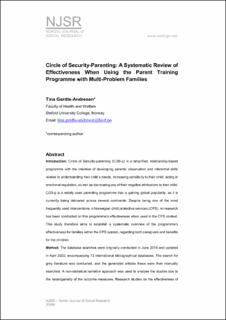Circle of Security - Parenting: A Systematic review on Effectiveness of use of the parent training program within Multi-problem Families
Peer reviewed, Journal article
Published version
Permanent lenke
https://hdl.handle.net/11250/2760127Utgivelsesdato
2021Metadata
Vis full innførselSamlinger
Sammendrag
Introduction: Circle of Security-parenting (COS-p) is a simplified, relationship-based programme with the intention of developing parents’ observation and inferential skills related to understanding their child’s needs, increasing sensitivity to their child, aiding in emotional regulation, as well as decreasing any of their negative attributions to their child. COS-p is a widely used parenting programme that is gaining global popularity, as it is currently being delivered across several continents. Despite being one of the most frequently used interventions in Norwegian child protective services (CPS), no research has been conducted on this programme’s effectiveness when used in the CPS context. This study therefore aims to establish a systematic overview of the programme’s effectiveness for families within the CPS system, regarding both caregivers and benefits for the children.
Method: The database searches were originally conducted in June 2018 and updated in April 2020, encompassing 13 international bibliographical databases. The search for grey literature was conducted, and the generated articles these were then manually searched. A non-statistical narrative approach was used to analyse the studies due to the heterogeneity of the outcome measures. Research studies on the effectiveness of COS-p intervention, where the participants reported a minimum of two specifically defined risk factors, were included for further analysis.
Results: Seven studies met the inclusion criteria. The studies included in the review focus on a diversity of separate and isolated factors concerning caregivers but not the effect of the accumulation of risk factors and how this may or may not influence the potential effectiveness of COS-p. The findings’ strengths include some improvements in reducing parental stress, increasing self-efficacy and parenting skills, and promoting an understanding of child behaviour. There is no conclusive evidence that COS-p assists in increasing the security of the parent-child attachment relationship.
Discussion: Given the limited number of studies, further research is needed to examine if COS-p improves child behaviour, if its effects can be sustained over time and if it is more effective for particular populations.

